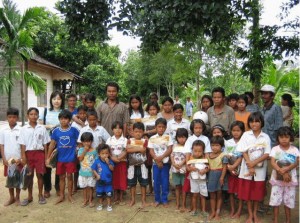We conducted 3 Discovery Trips mostly in West Kalimantan and in Jakarta. The objectives of the discovery trips were to understand the social-economic situations and determine its main economic potentials. In this short report, we discussed our findings on the overall social conditions.
In front of school in Sukarame village.
Western Kalimantan province is unique for 3 reasons. First, Islam is not the majority and ethnic Chinese is not the minority. Because of these, the social issues we regularly observed in other part of Indonesia were not present in this province. The corrupt elites and businessmen could not use religion to create social tension, oppressed the people, and at the end clear the land for farming or mining. Second, the quality and motivation of the leaderships were much better and purer in this province. We found they were really passionate to serve the people and had the capability to govern. Third, they were prone to ethnic conflict especially between the ethnic Madura and the local ethnic groups especially the Dayak and the Malay. Conflict between the Dayak, the Malay, and the Chinese was almost none because historically these three ethnics were considered the local ethnics and they live separately according to their groups.
In this write up, we want to discuss the root cause in this ethnic tension to find the solution to the conflict. Currently, Western Kalimantan province relies on Palm Oil, mining, and fisheries to provide jobs and income. The main focus of the province is Palm Oil as the world demand pike, which drives the price. The mining and fisheries are not really developed because of the lack of infrastructure such as roads, airports, and seaports, power, and telecommunications. To ramp up the production of palm oil, the central government tries to convert the tribal lands into farm land with intimidation, oppressive laws, and possibly to transmigration of the ethnic Madura. The land has become sensitive issues which led to bloody conflict in the past.
We found that there were 2 main causes of these tensions which often lead to bloody conflicts. One, the greedy businessmen want more land to open more oil palm plantation (Kelapa Sawit). These businessmen work through the corrupt politicians to obtain more land for their farms. Often times, they used the military to force the locals to sell their land. To the Malay, the land is viewed as an asset for them to generate income. They are very reluctant to sell because they do not want to lose their income. To the Dayak, the land is secret and is part of their existence as a people. They do not want to sell for any reason. Second, the arrival of ethnic Madura is viewed as part of the effort of the central government to relocate the local people. The temperament of ethnic Madura that abrasive has provoked the local to react negatively toward them. Because of these, the local ethnics want to make the conflict with the ethnic Madura as a symbol of their fight against the oppression and their pride of their ethnics. Until today, the ethnic Madura is still not comfortable crossing into Sambas or venture outside the coast and big cities.
As we dig further, it really became clear that the root cause was the corrupt elites, comprise of politicians, bureaucrats, and businessmen. For personal gain, they were willing to sacrifice the people. We found ample evidence that the elites tried to create social tension and conflict. The central government, for example, not only robbed the land but also forced schools to teach Islam to non-Muslim students. The central government purposefully sent a lot of Muslim religious teachers and college professors although the majority of the people were not Muslim. The over abundant Muslim teachers created a need for further Muslim students and hence serve to justify the transmigration.
We were headed to our meetings with the Lieutenant Governor and the Mayor of Singkawang with this issue in mind. We were taken back with their honesty, sincerity, and passion for the people. They were very honest and realized what they were up against. They were also sincere and passionate to serve. They said they did not care about the position or getting elected. They just wanted to serve the people.
We realized then that the virus is corrupt elites and the antidote is servant hood leadership. We need exemplary leaders to rid these corrupt elites. We will discuss the trait of these exemplary leaders in the subsequent section of 2010 discovery trip (DT 16).

